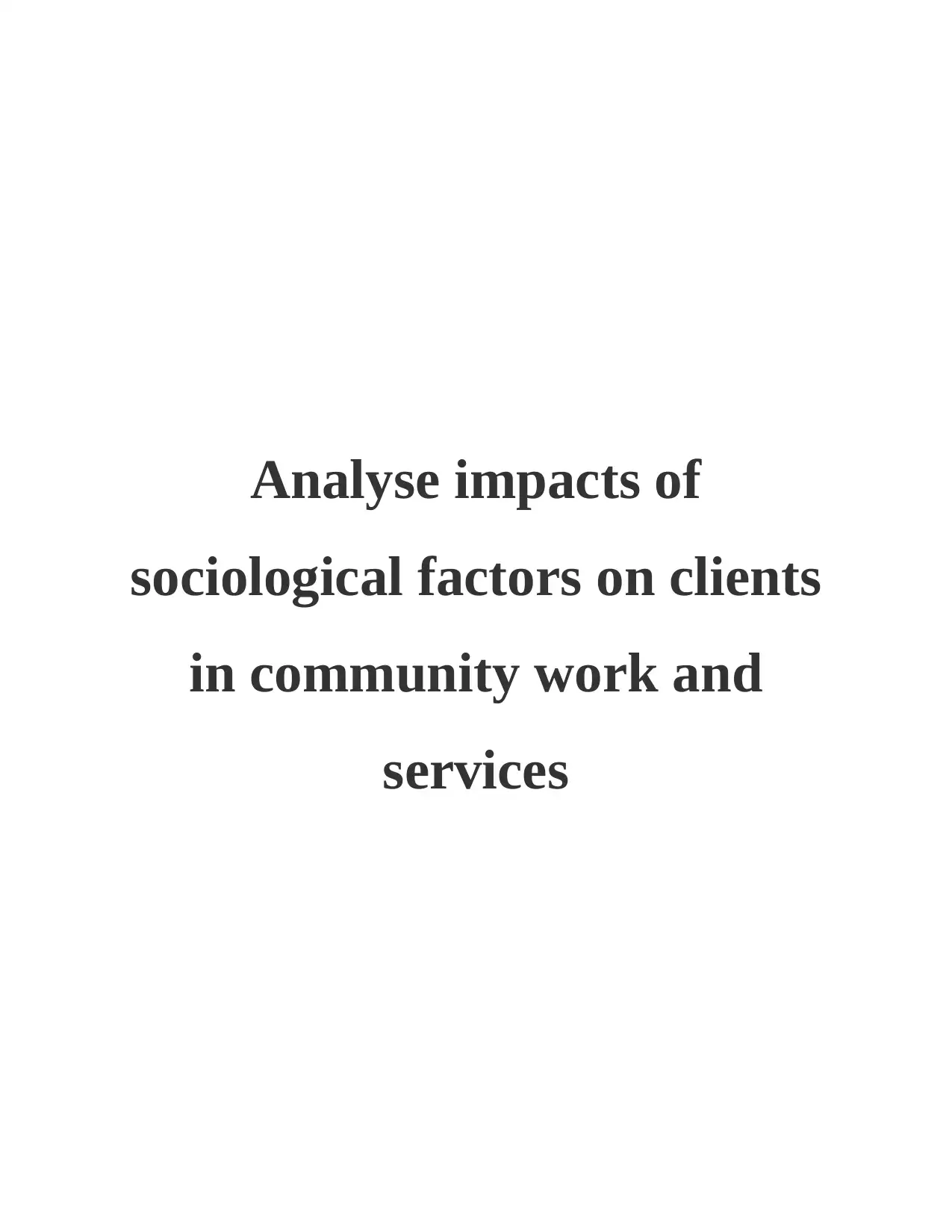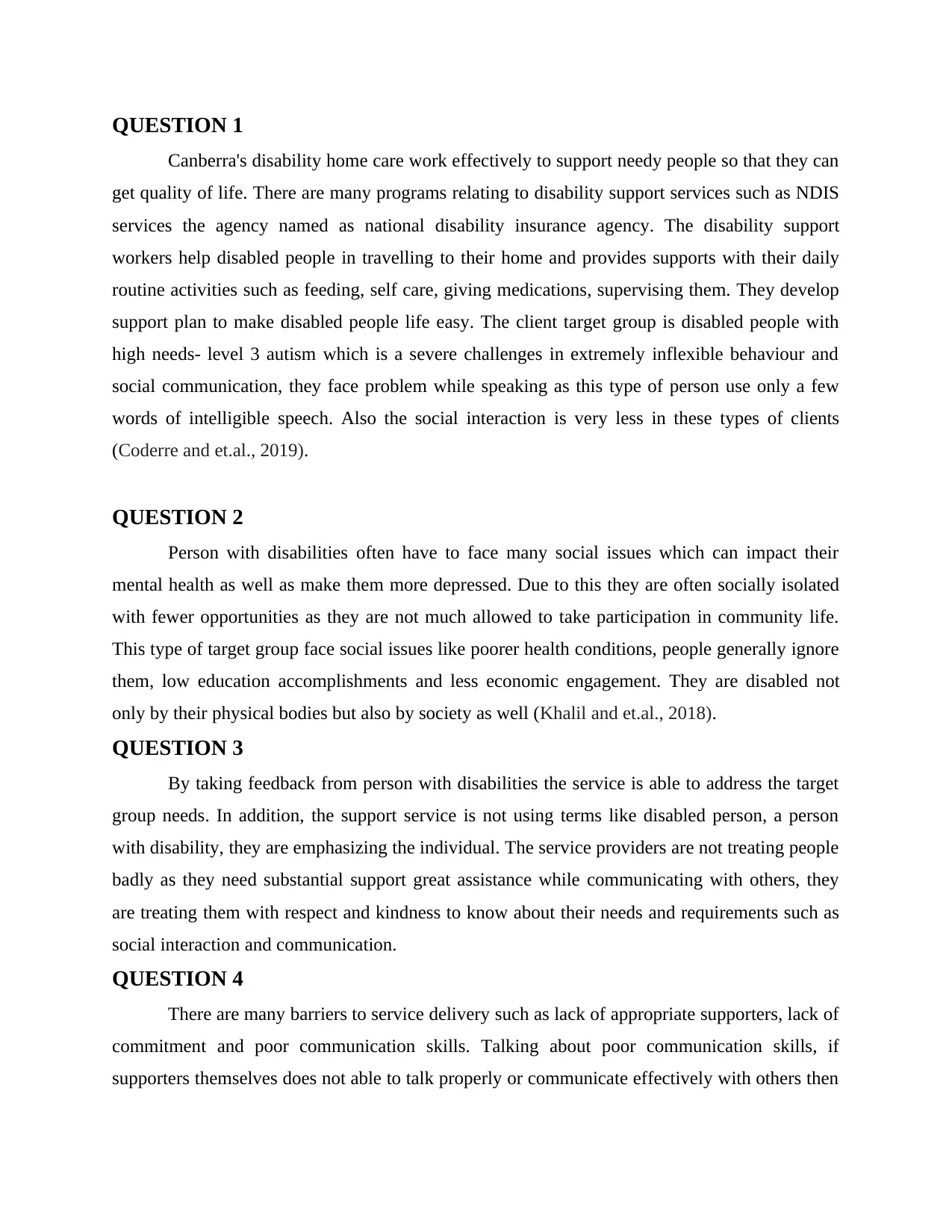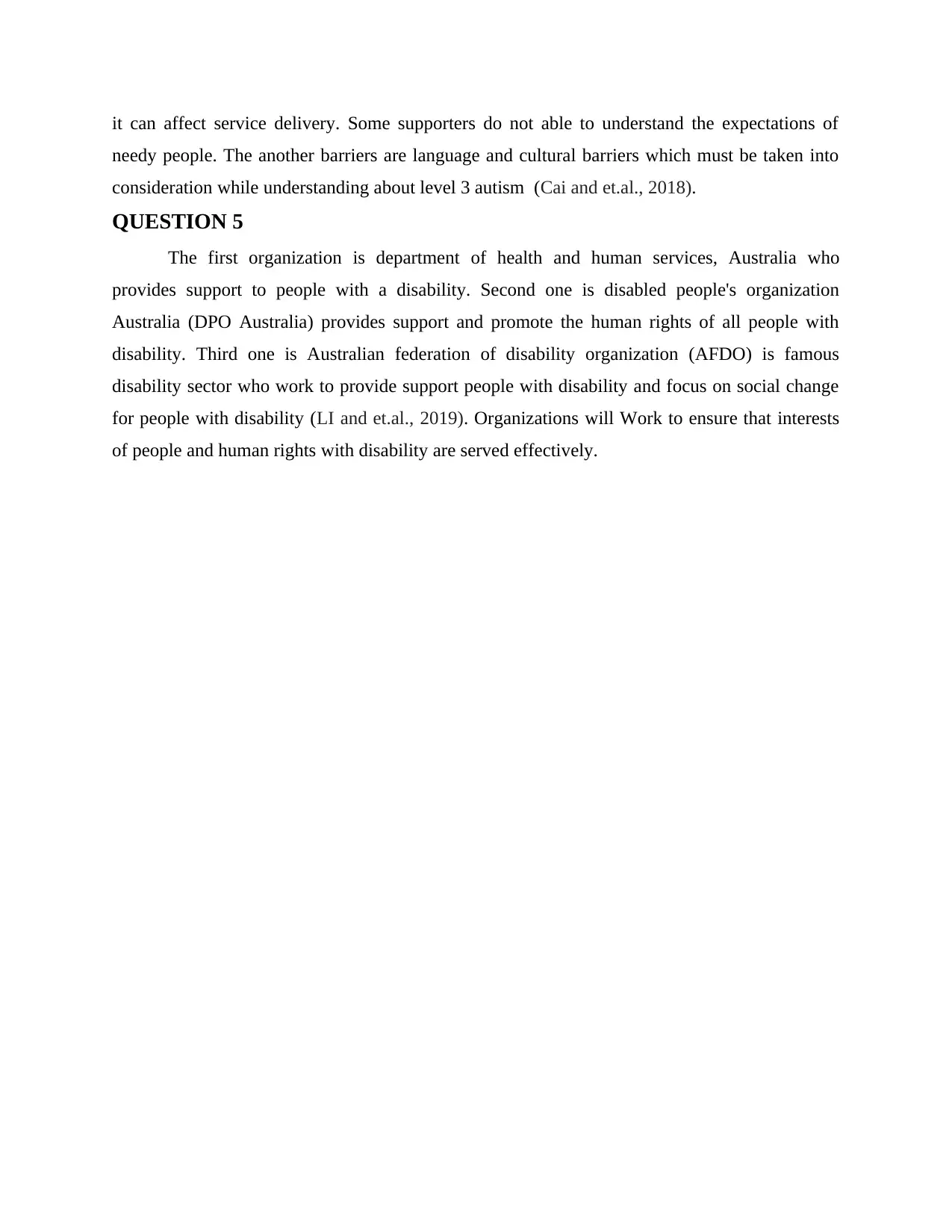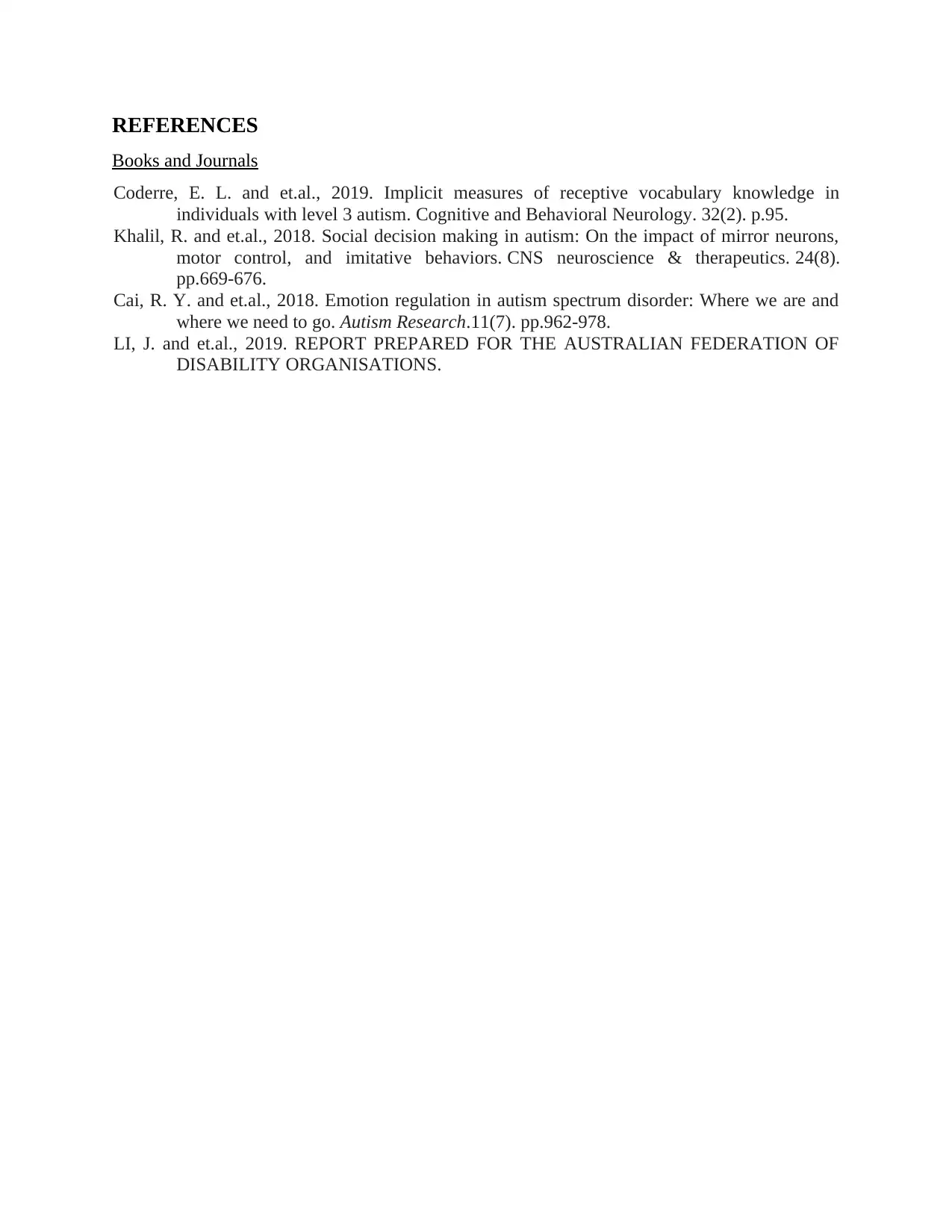Analyzing Impacts of Sociological Factors on Clients in Community Work
VerifiedAdded on 2023/06/07
|5
|705
|331
Essay
AI Summary
This essay explores the impacts of sociological factors on clients within community work and services, focusing on disability support in Canberra. It highlights programs like NDIS and the role of disability support workers in assisting individuals with daily activities, particularly those with level 3 autism. The analysis identifies social issues faced by people with disabilities, such as social isolation, poorer health, and limited opportunities, emphasizing the importance of feedback and respectful treatment from service providers. It also addresses barriers to service delivery, including poor communication skills and cultural differences. The essay concludes by listing organizations like the Department of Health and Human Services, DPO Australia, and AFDO, which support people with disabilities and promote their human rights.

Analyse impacts of
sociological factors on clients
in community work and
services
sociological factors on clients
in community work and
services
Paraphrase This Document
Need a fresh take? Get an instant paraphrase of this document with our AI Paraphraser

TABLE OF CONTENT
QUESTION 1...................................................................................................................................3
QUESTION 2...................................................................................................................................3
QUESTION 3 ..................................................................................................................................3
QUESTION 4...................................................................................................................................3
QUESTION 5 ..................................................................................................................................4
REFERENCES................................................................................................................................5
QUESTION 1...................................................................................................................................3
QUESTION 2...................................................................................................................................3
QUESTION 3 ..................................................................................................................................3
QUESTION 4...................................................................................................................................3
QUESTION 5 ..................................................................................................................................4
REFERENCES................................................................................................................................5

QUESTION 1
Canberra's disability home care work effectively to support needy people so that they can
get quality of life. There are many programs relating to disability support services such as NDIS
services the agency named as national disability insurance agency. The disability support
workers help disabled people in travelling to their home and provides supports with their daily
routine activities such as feeding, self care, giving medications, supervising them. They develop
support plan to make disabled people life easy. The client target group is disabled people with
high needs- level 3 autism which is a severe challenges in extremely inflexible behaviour and
social communication, they face problem while speaking as this type of person use only a few
words of intelligible speech. Also the social interaction is very less in these types of clients
(Coderre and et.al., 2019).
QUESTION 2
Person with disabilities often have to face many social issues which can impact their
mental health as well as make them more depressed. Due to this they are often socially isolated
with fewer opportunities as they are not much allowed to take participation in community life.
This type of target group face social issues like poorer health conditions, people generally ignore
them, low education accomplishments and less economic engagement. They are disabled not
only by their physical bodies but also by society as well (Khalil and et.al., 2018).
QUESTION 3
By taking feedback from person with disabilities the service is able to address the target
group needs. In addition, the support service is not using terms like disabled person, a person
with disability, they are emphasizing the individual. The service providers are not treating people
badly as they need substantial support great assistance while communicating with others, they
are treating them with respect and kindness to know about their needs and requirements such as
social interaction and communication.
QUESTION 4
There are many barriers to service delivery such as lack of appropriate supporters, lack of
commitment and poor communication skills. Talking about poor communication skills, if
supporters themselves does not able to talk properly or communicate effectively with others then
Canberra's disability home care work effectively to support needy people so that they can
get quality of life. There are many programs relating to disability support services such as NDIS
services the agency named as national disability insurance agency. The disability support
workers help disabled people in travelling to their home and provides supports with their daily
routine activities such as feeding, self care, giving medications, supervising them. They develop
support plan to make disabled people life easy. The client target group is disabled people with
high needs- level 3 autism which is a severe challenges in extremely inflexible behaviour and
social communication, they face problem while speaking as this type of person use only a few
words of intelligible speech. Also the social interaction is very less in these types of clients
(Coderre and et.al., 2019).
QUESTION 2
Person with disabilities often have to face many social issues which can impact their
mental health as well as make them more depressed. Due to this they are often socially isolated
with fewer opportunities as they are not much allowed to take participation in community life.
This type of target group face social issues like poorer health conditions, people generally ignore
them, low education accomplishments and less economic engagement. They are disabled not
only by their physical bodies but also by society as well (Khalil and et.al., 2018).
QUESTION 3
By taking feedback from person with disabilities the service is able to address the target
group needs. In addition, the support service is not using terms like disabled person, a person
with disability, they are emphasizing the individual. The service providers are not treating people
badly as they need substantial support great assistance while communicating with others, they
are treating them with respect and kindness to know about their needs and requirements such as
social interaction and communication.
QUESTION 4
There are many barriers to service delivery such as lack of appropriate supporters, lack of
commitment and poor communication skills. Talking about poor communication skills, if
supporters themselves does not able to talk properly or communicate effectively with others then
⊘ This is a preview!⊘
Do you want full access?
Subscribe today to unlock all pages.

Trusted by 1+ million students worldwide

it can affect service delivery. Some supporters do not able to understand the expectations of
needy people. The another barriers are language and cultural barriers which must be taken into
consideration while understanding about level 3 autism (Cai and et.al., 2018).
QUESTION 5
The first organization is department of health and human services, Australia who
provides support to people with a disability. Second one is disabled people's organization
Australia (DPO Australia) provides support and promote the human rights of all people with
disability. Third one is Australian federation of disability organization (AFDO) is famous
disability sector who work to provide support people with disability and focus on social change
for people with disability (LI and et.al., 2019). Organizations will Work to ensure that interests
of people and human rights with disability are served effectively.
needy people. The another barriers are language and cultural barriers which must be taken into
consideration while understanding about level 3 autism (Cai and et.al., 2018).
QUESTION 5
The first organization is department of health and human services, Australia who
provides support to people with a disability. Second one is disabled people's organization
Australia (DPO Australia) provides support and promote the human rights of all people with
disability. Third one is Australian federation of disability organization (AFDO) is famous
disability sector who work to provide support people with disability and focus on social change
for people with disability (LI and et.al., 2019). Organizations will Work to ensure that interests
of people and human rights with disability are served effectively.
Paraphrase This Document
Need a fresh take? Get an instant paraphrase of this document with our AI Paraphraser

REFERENCES
Books and Journals
Coderre, E. L. and et.al., 2019. Implicit measures of receptive vocabulary knowledge in
individuals with level 3 autism. Cognitive and Behavioral Neurology. 32(2). p.95.
Khalil, R. and et.al., 2018. Social decision making in autism: On the impact of mirror neurons,
motor control, and imitative behaviors. CNS neuroscience & therapeutics. 24(8).
pp.669-676.
Cai, R. Y. and et.al., 2018. Emotion regulation in autism spectrum disorder: Where we are and
where we need to go. Autism Research.11(7). pp.962-978.
LI, J. and et.al., 2019. REPORT PREPARED FOR THE AUSTRALIAN FEDERATION OF
DISABILITY ORGANISATIONS.
Books and Journals
Coderre, E. L. and et.al., 2019. Implicit measures of receptive vocabulary knowledge in
individuals with level 3 autism. Cognitive and Behavioral Neurology. 32(2). p.95.
Khalil, R. and et.al., 2018. Social decision making in autism: On the impact of mirror neurons,
motor control, and imitative behaviors. CNS neuroscience & therapeutics. 24(8).
pp.669-676.
Cai, R. Y. and et.al., 2018. Emotion regulation in autism spectrum disorder: Where we are and
where we need to go. Autism Research.11(7). pp.962-978.
LI, J. and et.al., 2019. REPORT PREPARED FOR THE AUSTRALIAN FEDERATION OF
DISABILITY ORGANISATIONS.
1 out of 5
Related Documents
Your All-in-One AI-Powered Toolkit for Academic Success.
+13062052269
info@desklib.com
Available 24*7 on WhatsApp / Email
![[object Object]](/_next/static/media/star-bottom.7253800d.svg)
Unlock your academic potential
Copyright © 2020–2025 A2Z Services. All Rights Reserved. Developed and managed by ZUCOL.




